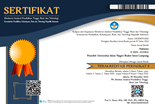Growth Mindset: The Effectiveness of Growth Mindset Training for Karang Taruna
Abstract
This study examines the impact of growth mindset training on Karang Taruna Taruna Bhakti members in Dusun Banyunganti Lor. The training aimed to enhance participants' understanding of growth mindset principles, distinguish between growth and fixed mindsets, recognize the benefits of a growth mindset in an organization, and develop strategies to nurture a growth mindset. A pretest-posttest design was employed, and results showed significant improvements across all key indicators, demonstrating the effectiveness of the training. Participants exhibited high engagement, which contributed to the positive outcomes. However, the study faced limitations, including potential bias from non-standardized surveys and individual differences in responses. These limitations suggest that while the training was effective, the observed improvements may not be uniformly applicable to all members. To address these issues, future training sessions should incorporate standardized survey instruments to reduce bias and consider individual differences.
Additionally, logistical challenges, such as the co-trainer shortage and limited access to multimedia tools, should be addressed to enhance the learning experience. Future research could explore the long-term effects of growth mindset training on organizational performance and the impact of integrating interactive, technology-driven methods. Despite the challenges, the training fostered a growth mindset, equipping members with the resilience and adaptability needed for their roles, thereby contributing positively to the community.
References
Angrosino, M. (2007). Doing ethnographic and observational research. Sage Publications.
Blackwell, L. S., Trzesniewski, K. H., & Dweck, C. S. (2007). Implicit theories of intelligence predict achievement across an adolescent transition: A longitudinal study and an intervention. Child Development, 78(1), 246-263.
Claro, S., Paunesku, D., & Dweck, C. S. (2016). Growth mindset tempers the effects of poverty on academic achievement. Proceedings of the National Academy of Sciences, 113(31), 8664-8668. https://doi.org/10.1073/pnas.1608207113
Creswell, J. W., & Creswell, J. D. (2017). Research design: Qualitative, quantitative, and mixed methods approaches (5th ed.). Sage Publications.
Dweck, C. S. (2006). Mindset: The New Psychology of Success. Random House.
Heslin, P. A., & Keating, L. A. (2017). In learning mode? The role of mindsets in derailing and enabling experiential leadership development. The Leadership Quarterly, 28(3), 367-384.
Keating, L. A., Heslin, P. A., & Ashford, S. J. (2019). A meta-analysis of the effect of growth mindset on performance. Journal of Applied Psychology, 104(10), 1385-1404. https://doi.org/10.1037/apl0000418
Kemenpora. (2018). Karang Taruna: Wadah Kepemudaan untuk Kemajuan Bangsa. Kementerian Pemuda dan Olahraga.
Krueger, R. A., & Casey, M. A. (2014). Focus groups: A practical guide for applied research (5th ed.). Sage Publications.
Morgan, D. L. (1997). Focus groups as qualitative research (2nd ed.). Sage Publications.
Patton, M. Q. (2015). Qualitative research & evaluation methods: Integrating theory and practice (4th ed.). Sage Publications.
Paunesku, D., Walton, G. M., Romero, C., Smith, E. N., Yeager, D. S., & Dweck, C. S. (2015). Mind-set interventions are a scalable treatment for academic underachievement. Psychological Science, 26(6), 784-793. https://doi.org/10.1177/0956797615571017
Yeager, D. S., & Dweck, C. S. (2012). Mindsets that promote resilience: When students believe that personal characteristics can be developed. Educational Psychologist, 47(4), 302-314.
DOI: http://dx.doi.org/10.24042/ajp.v8i1.25998
Refbacks
- There are currently no refbacks.
Copyright (c) 2025 Rizka Salma Adelia













